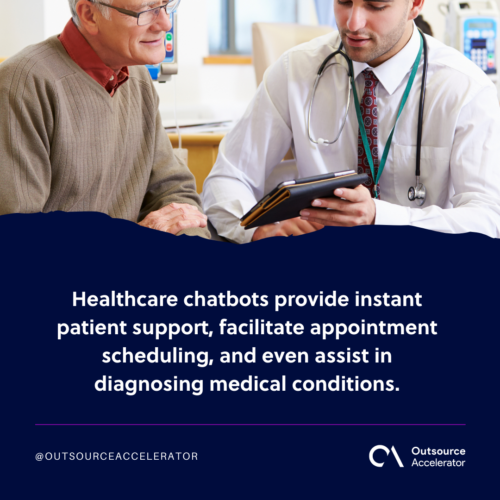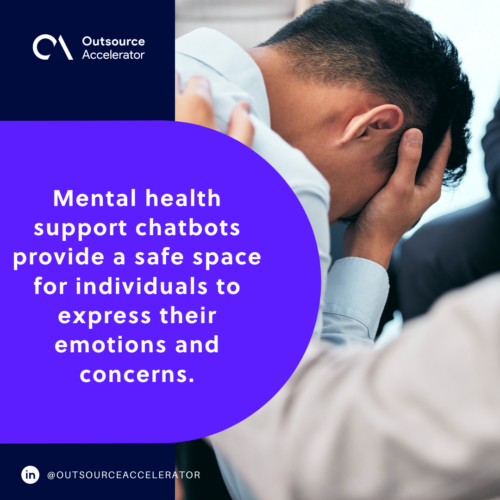Healthcare chatbots: Definition, types, and integration

Healthcare organizations struggle with growing patient populations, complex administrative workflows, and a need for accurate, timely diagnoses.
Today, there are what are called healthcare chatbots. These medical AI assistants can integrate seamlessly with electronic health records, ensuring accurate and up-to-date patient information.
Healthcare chatbots alleviate the burden on healthcare professionals, allowing them to focus on critical patient care.
This article dives deep into healthcare chatbots, from their inner workings to types and integrations.
Understanding healthcare chatbots
Healthcare chatbots are advanced virtual helpers programmed to communicate with users like humans. They provide instant patient support, facilitate appointment scheduling, and even assist in diagnosing medical conditions.
They perform various tasks such as:
- Reminding patients to take their medicines
- Giving medical advice
- Setting appointments
- Supporting mental well-being
These healthcare chatbots are made using combined algorithms, natural language processing (NLP), and machine learning (ML).

How healthcare chatbots work
Imagine healthcare chatbots as smart helpers with a clever mix of skills. They use two special abilities:
- Understanding your words
- Learning from your experiences
The first method used by the healthcare chatbot is natural language processing (NLP). It lets chatbots understand what you’re saying, just like when you talk to friends.
Machine learning, on the other hand, stands as the healthcare chatbot’s memory and learning center. Through this, chatbots remember all their conversations with users and use them to improve over time.
Similarly, healthcare chatbots start with some basic answers and get smarter with each chat. They mix what they’ve learned with their pre-set knowledge to give you accurate and useful information.
The more you converse with virtual medical assistants, the better they become at helping you with your health questions.
Here are two of the healthcare chatbots’ functionalities:
Integration with electronic health records
Healthcare providers can easily integrate chatbots with electronic health records (EHRs). This integration allows chatbots to access a patient’s medical history, prescriptions, and treatment plans and load them into a specific folder.
As a result, medical providers can seamlessly provide tailored advice and support based on individual health profiles.
Ensuring patient data security and privacy
Healthcare chatbots are designed to keep your data safe. They use encryption and secure authentication. Chatbots only let authorized people access your info.
But that’s not all—healthcare chatbots have regular check-ups too. They undergo security tests and reviews to ensure no threat actor can enter the system.

Healthcare chatbots vs. Regular chatbots
Healthcare chatbots are different from regular chatbots. Even though they both work by talking with people, healthcare chatbots are more specialized. They know a lot about medical data and how healthcare works.
On the other hand, regular chatbots aren’t as smart about medical information. They might not understand difficult medical questions and usually can’t be integrated with other critical systems.
Regular chatbots are more general and might help with things like answering simple questions or helping you buy products.
Types of healthcare chatbots
The versatility of healthcare chatbots shines through the various roles they can assume within the medical ecosystem.
Here are the following types of healthcare chatbots:
Symptom checkers and triage chatbots
This healthcare chatbot offers preliminary insights into potential conditions and recommends appropriate next steps, such as self-care or seeking medical attention.
Triage healthcare chatbots build upon this foundation by incorporating a critical dimension of prioritization. They assess symptoms’ severity and urgency, swiftly identifying cases that require immediate attention.
By categorizing cases based on medical urgency, triage chatbots ensure that patients with serious conditions are promptly directed to medical professionals.
Appointment scheduling chatbots
Appointment scheduling chatbots streamline the process of booking medical appointments. With real-time access to healthcare providers’ schedules, these healthcare chatbots offer patients optimal time slots, accommodating their preferences.
This technology eliminates the need for lengthy phone calls and reduces the chance of errors in appointment settings.
As a result, healthcare providers can allocate more time and resources to delivering quality patient care.
Medication management chatbots
Medication management chatbots serve as vigilant companions in helping older patients adhere to their prescribed medication regimens.
These healthcare chatbots send timely reminders, ensuring patients take medications as directed. They also educate patients about their medications, potential side effects, and proper usage.
Moreover, these healthcare AI assistants may facilitate prescription refills by guiding patients through the process.
Mental health support chatbots
Mental health support chatbots are vital in addressing the growing demand for mental health services. They provide a safe space for individuals to express their emotions and concerns.
Through compassionate interactions, these healthcare chatbots offer coping strategies, relaxation techniques, and resources for managing mental health challenges.
Note that these chatbots don’t mean to replace human therapists. Rather, they are programmed to extend a helping hand to those in need, especially during non-office hours.

Post-discharge follow-up chatbots
Post-discharge follow-up chatbots extend care beyond the hospital stay. These healthcare chatbots communicate with patients, ensuring they adhere to post-discharge instructions and monitoring their recovery progress.
Patients can report any issues or complications to the bot, which can then escalate concerns to healthcare providers when necessary.
This continuous virtual connection offers reassurance to patients during their recovery journey and enables timely interventions if problems arise.
Integrate healthcare chatbots with your healthcare systems
Healthcare chatbots are poised to reshape the healthcare landscape by:
- Improving patient experiences
- Streamlining processes
- Augmenting healthcare professionals’ capabilities
Understanding their functions, differentiating them from regular chatbots, and exploring their various applications will empower healthcare providers to leverage this technology effectively.
Furthermore, by integrating these intelligent assistants thoughtfully into healthcare systems, providers can unlock a new era of patient-centered care.







 Independent
Independent




